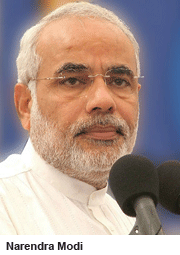The politics of confrontation practiced by the Narendra Modi government is adversely impacting education in Gujarat. The chief minister’s fetish for unrestricted control, which has ensured Gujarat remained without a Lok Ayukta (ombudsman) for most of his almost 11-year rule of the state, is now impacting the state’s education system.
 Two key education Bills have become the subject of a lob and volley slanging match between the state government and governor Dr. Kamala Beniwal. In May, Beniwal had sent back the Gujarat Professional Technical Educational Colleges or Institutions (Regulation of Admission and Fixation of fees) (Amendment) Bill, 2012 and the Institute of Infrastructure, Technology, Research and Management (IITRM) Bill, 2012 — passed by the BJP-dominated legislative assembly in February — citing several legal infirmities.
Two key education Bills have become the subject of a lob and volley slanging match between the state government and governor Dr. Kamala Beniwal. In May, Beniwal had sent back the Gujarat Professional Technical Educational Colleges or Institutions (Regulation of Admission and Fixation of fees) (Amendment) Bill, 2012 and the Institute of Infrastructure, Technology, Research and Management (IITRM) Bill, 2012 — passed by the BJP-dominated legislative assembly in February — citing several legal infirmities.
In a patent snub to the governor, the Modi government tabled the two Bills without any changes in a one-day assembly session of July 19, and passed it by a majority vote. The Bills are now back with the governor for her assent.
Among the legal infirmities cited by the governor vis-à-vis the IITRM Bill, 2012 is that the proposed IITRM will be governed by a chairperson instead of a vice chancellor. Moreover in a break with normative practice under which the governor is chancellor of all institutions of higher education, IITRM will be out of her purview. By ss. 10-11 of the Bill, the government proposes to vest all powers of the chancellor in IITRM’s chairman. In the state budget for fiscal 2012-13, the Gujarat government has provisioned a grant of Rs.67 crore for the institute.
Beniwal also has objections to the Gujarat Professional Technical Educational Colleges or Institutions Bill, 2012. She is reportedly against provisions in the Bill which give private colleges/universities the freedom to determine their own tuition fees. She has also questioned why there isn’t a reserved quota for students writing the state government’s CET (Common Entrance Test). According to her, institutes and colleges established on land given at concessional prices should be subject to state government control on these two issues.
Gujarat’s education minister Ramanlal Vora has made it clear the government is not prepared to accept the objections raised by the governor. “Raj Bhavan didn’t object to similar provisions in earlier Bills pertaining to the establishment of the Pandit Deendayal Upadhyaya Petroleum University, Gandhinagar in 2007, or the Raksha Shakti University to name a few. So why the objection now?” he queries.
The animosity between the governor and chief minister is rooted in the governor’s unilateral appointment of Justice (Retd.) R.A. Mehta as Lok Ayukta of the state last August — a post which had been lying vacant for over seven years during Modi’s rule. Following a national furore, the Gujarat high court upheld the governor’s appointment in the public interest.
According to monitors of the education scene in Gujarat, Modi has reason to fear the appointment of an independent Lok Ayukta. Loyal partymen rather than proven academic administrators are being appointed vice chancellors of state universities in Gujarat where standards of education are widely perceived to be below par. For instance, Raksha Shakti University (estb. 2009) has a police officer with a tainted record heading it, while the vice chancellor of Gujarat University has charges of corruption filed against him. Another party faithful turned academic is the vice chancellor of the Indian Institute of Teachers Education and nominee of the state government on the board of IIM-Ahmedabad.
Such instances of questionable appointments in academia are numerous, prompting accusations that the only qualification required for top jobs in public institutions is personal loyalty to Gujarat’s imperious chief minister, who is looking beyond the assembly elections later this year in which a BJP victory is a foregone conclusion, to the top job in New Delhi.
R.K. Misra (Gandhinagar)


















